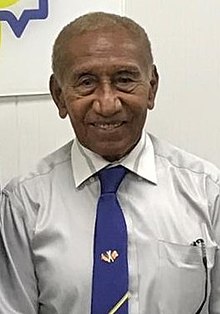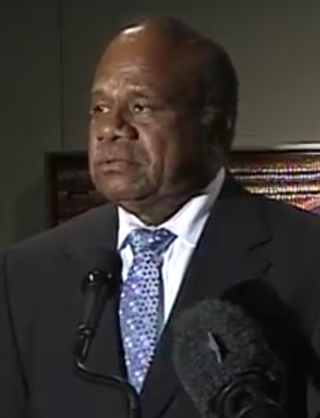
Sir Rabbie Langanai Namaliu was a Papua New Guinean politician. He served as the fourth prime minister of Papua New Guinea from 4 July 1988 to 17 July 1992 as leader of the Pangu Party.
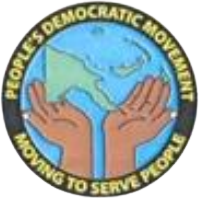
The People's Democratic Movement is a political party in Papua New Guinea.
The Sandline affair was a political scandal that became one of the defining moments in the history of Papua New Guinea,and particularly the conflict in Bougainville. It brought down the government of Sir Julius Chan,and brought Papua New Guinea to the verge of a military revolt. The event was named after Sandline International,a United Kingdom-based private military company.
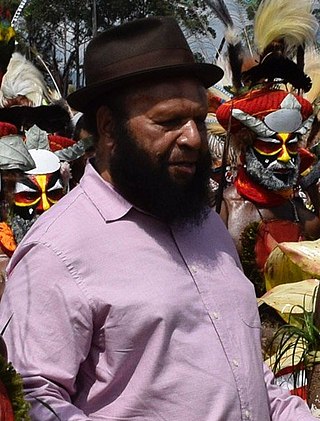
Paias Wingti is a Papua New Guinean politician. He served as the third prime minister of Papua New Guinea between 1985 and 1988,and again from 1992 to 1994.

Jerry Singirok was the commander of the Papua New Guinea Defence Force throughout the Sandline affair of 1997.
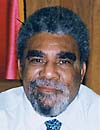
Sir Mekere Morauta was a Papua New Guinean politician and economist who served as the 7th Prime Minister of Papua New Guinea from 1999 to 2002. Inheriting a depressed economy and a fractious legislature,he embarked on fundamental reforms of the country's economy and political system.
Arthur Somare is a former Member of the National Parliament of Papua New Guinea (PNG). He represented the electorate of Angoram Open in East Sepik province for the National Alliance Party from 1997 until he lost in the 2012 general elections.

Sir Michael Thomas Somare was a Papua New Guinean politician. Widely called the "father of the nation",he was the first Prime Minister after independence. At the time of his death,Somare was also the longest-serving prime minister,having been in office for 17 years over three separate terms:from 1975 to 1980;from 1982 to 1985;and from 2002 to 2011. His political career spanned from 1968 until his retirement in 2017. Besides serving as PM,he was minister of foreign affairs,leader of the opposition and governor of East Sepik Province.
Puri Ruing is a Papua New Guinean politician. He was a member of the National Parliament of Papua New Guinea from 1997 to 2002 and from 2007 to 2012,representing the electorate of Dei Open. He served as Minister of Justice under Mekere Morauta,Minister for Internal Security under Michael Somare and Minister for Civil Aviation under Peter O'Neill.
The New Generation Party is a political party in Papua New Guinea.

Sir Puka Temu,,is a Papua New Guinean politician. He has been a member of the National Parliament of Papua New Guinea since 2002,representing the electorate of Abau Open. A former Deputy Prime Minister under Michael Somare,he is part of Prime Minister James Marape's government as a member of the Our Development Party.
Sam Akoitai was politician from Papua New Guinea. A member of the United Resources Party,he served in several ministerial roles and ran for president of the country.
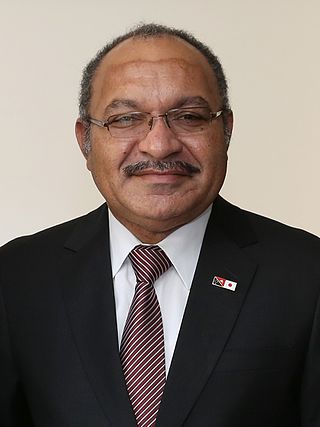
Peter Charles Paire O'Neill is a Papua New Guinean politician who served as the seventh Prime Minister of Papua New Guinea from 2011 to 2019. He has been a Member of Parliament for Ialibu-Pangia since 2002. He was a former cabinet minister and the leader of the People's National Congress between 2006 and 2022. He resigned his position as prime minister to avoid a vote of no confidence,and he was succeeded by James Marape.
Belden Namah is a Papua New Guinean politician. Namah is a member of the National Parliament for the Papua New Guinea Party,and has represented Vanimo-Green River District since 2007. He served in the Cabinet from 2007 to 2010,and as Deputy Prime Minister from 2011 to 2012. In 2012,Namah became a member of the opposition. After retaining his seat in the 2022 election,he said that he would not rejoin the opposition.
2011–2012 Papua New Guinean constitutional crisis was a dispute between Sir Michael Somare and Peter O'Neill. Both claimed to be Prime Minister of Papua New Guinea.

Papua New Guinea's Ministry of Finance is the department responsible for the "protection of public money" in Papua New Guinea (PNG). The ministry aims to improve "the transparency and accountability of the accounting and financial reporting and their frameworks" in the country. The ministry is led by a Minister of Finance. The headquarters of the ministry are at Vulupindi Haus,Waigani.
Bartholomew "Bart" Philemon is a Papua New Guinean politician.
Sir John Pundari is a Papua New Guinean politician. He has been Speaker of the National Parliament (1997–1999),Deputy Prime Minister (1999),Minister for Foreign Affairs (2001),and has served as the Minister of Finance and Rural Development from 20 December 2020 to 2021.
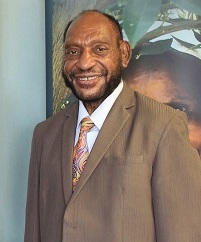
The Right Honourable Chief Sir Peter Ipatas,KBE,GCL,MP is a Papua New Guinean politician and businessman,and is the current governor of Enga province. Ipatas has been re-elected to the parliament for six consecutive terms since 1997. He is commonly known throughout the country as the "Action Governor". Chief Ipatas is also known as the Father of Free Education Policy in the country. He first assumed office in 1997.
